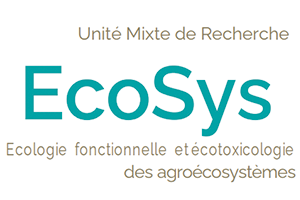

ECOSYS
Agroecossytems – Biomass Production – Recycling – Biodiversity
The Component presentation
The study of agroecosystem functioning lies at the heart of ECOSYS’s activities, with a focus on biogeochemical processes, material and energy fluxes, and the roles of organisms—whether isolated or in interaction with their environment.
Agroecosystems are subject to external forcing, prompting technical interventions by farmers (e.g., nitrogen inputs, pesticide use, organic waste recycling, soil tillage, and selection of crop varieties or species) to overcome constraints and achieve production goals. Some of ECOSYS’s applied research outcomes contribute directly to the ecosystem services required by agroecosystems. As such, the concept of ecosystem services provides a unifying framework for structuring and valorizing the unit’s research outputs.
Research topics
-
Biomass
-
Climate
-
Contaminants
-
Diversity


Environmental Biochemistry Platform
The Biochem-Env Environmental Biochemistry Platform provides seervices to both academic research teams and private-sector partners in the fields of agroecology and ecotoxicology. It specializes in the development and measurement of biochemical indicators in the environment and within organisms from terrestrial ecosystems. Its missions include : -Conducting research projects and delivering services related to experimentation and ecosystem monitoring, in line with Open Science principles; -Developing, validating, and transferring analytical methods and data interpretation protocols, including standardization; -Providing access to expertise, equipment, and laboratory facilities for biochemical analysis; -Carrying out expert assessments, scientific and technical monitoring, and training activities.
Success stories - QualiAgro avec VEOLIA
The use of residual organic materials as fertilizers in agriculture is an age-old practice that enables the return of nutrients and organic matter to the soil. In addition to livestock effluents, agro-industries and urban activities produce materials of potential agronomic interest—such as biowaste, sewage sludge, wastewater, and green waste. However, these materials may also carry biological, organic, or inorganic contaminants, and their application to agricultural land must be managed to avoid adverse environmental impacts.
Since 1998, INRAE ECOSYS and Veolia have collaborated to assess the agronomic value and potential environmental impacts of applying urban-origin residual organic products (ROPs) to agricultural soils. As part of this collaboration, the QualiAgro field site was established to monitor the long-term effects of repeated ROP applications. This site is one of the founding locations of the SOERE PRO network, a multi-institutional research infrastructure (INRAE, CIRAD) dedicated to observing the effects of repeated ROP inputs in agriculture. SOERE PRO is part of the ANAEE-France infrastructure and is officially recognized by INRAE as a collective scientific platform.
QualiAgro provides a framework to evaluate both the agronomic benefits and potential environmental impacts of ROP recycling. The site and the SOERE PRO network are regularly used to support PhD research, open research programs, and scientific collaborations. Since its creation, this initiative has resulted in over fifty peer-reviewed scientific publications.
The long-standing partnership with Veolia strengthens the practice of ROP recycling in agriculture, providing long-term data, samples, and research findings to support the development of new insights and responses to emerging questions in this field.
